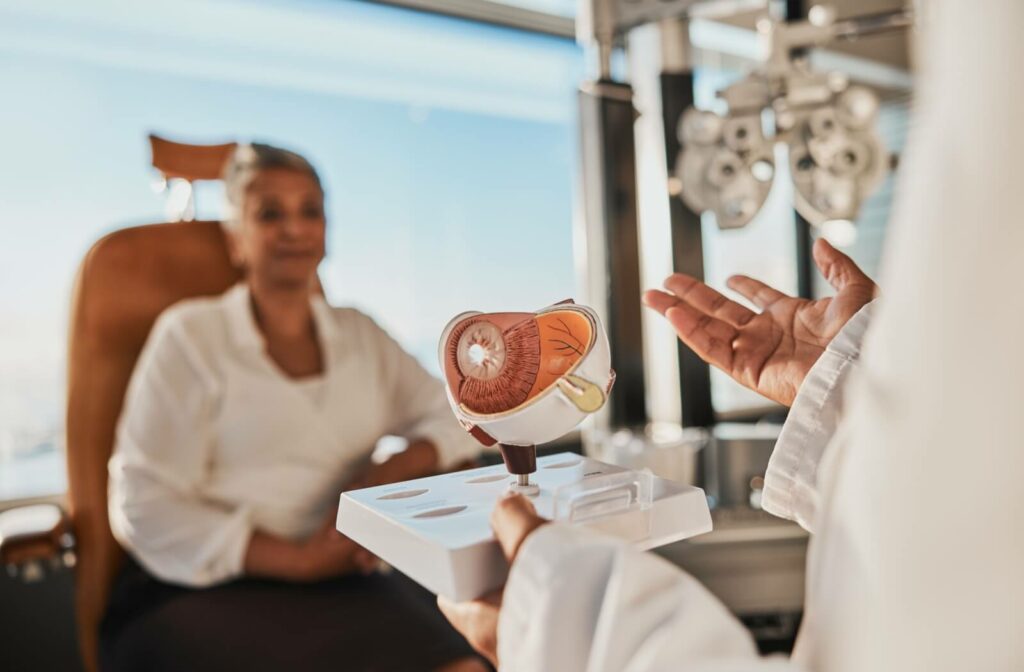With age comes a noticeable transformation. You grow wiser and more confident, even as your eyes undergo visual changes, like cataracts. However, although cataracts affect the quality and clarity of your vision with time, it’s one of the few eye conditions that is fully treatable!
Cataract surgery restores vision by replacing the eye’s cloudy lens with an artificial one.
With improvements in laser technology, surgical techniques, and prescription medication, patients might experience minor discomfort, but little to no pain during the procedure.
A cataract surgery consultation is the first step to clearer vision. Our expert EyeQ Optical team is here to guide and support you throughout this process.
Your Guide to Cataract Surgery
Cataracts are a common eye condition that occurs when the eye’s clear lens becomes cloudy, affecting the clarity of your vision. They often develop with age but can also happen as a result of an injury or other factors.
Cataracts make it seem as if you’re looking through a foggy window. Your vision may become blurry, hazy, and/or cloudy. As cataracts continue developing, everyday tasks like reading, driving, or working on your computer become more challenging as vision becomes increasingly impaired.
Fortunately, cataracts are very treatable, although there’s only one surefire solution: surgery.
What is Cataract Surgery?
Cataract surgery involves removing the clouded lens and replacing it with an artificial one, called an intraocular lens (IOL). This safe and effective surgery has a high success rate and is one of the most commonly performed procedures worldwide!
Since the eye’s lens gradually becomes cloudy, not everyone with cataracts needs surgery right away. Managing early cataracts is possible with prescription glasses or better lighting. However, if your cataract is severe enough to affect your quality of life or prevent you from completing daily tasks, it might be time for surgery.
Your optometrist is here to guide you every step of the way. From diagnosing the condition to monitoring its progression, we can help you decide whether it’s time for surgery based on your specific needs and lifestyle.
Is Cataract Surgery Painful?
The great news is that cataract surgery is not painful!
Thanks to anesthetic eye drops and modern technology, you shouldn’t feel any pain during the procedure. Some patients report slight pressure or a mild sense of movement in the eye, but no discomfort.
After surgery, you might experience minor discomfort or a scratchy feeling as your eye heals. However, these symptoms are often mild and temporary and easily managed with prescription eye drops and artificial tears.

Starting Your Journey: The Cataract Consultation
Despite how safe, common, and effective the cataract surgery is, it’s still a medical treatment that requires precision care. The first step in your treatment journey is a consultation with your optometrist.
During this session, we will determine whether cataract surgery is necessary and guide you through every detail of the process.
Think of this consultation as a roadmap for your treatment. We’ll verify that your expectations align with the procedure by helping you choose the right type of intraocular lens (there are several options) and by easing any concerns that you might have.
From diagnosing your cataracts to sending a referral for surgery, here’s what you can expect from your optometrist:
- Monitoring cataract progression: After the initial diagnosis, your optometrist will check the severity of your cataracts by assessing its progression since your last visit through visual testing, a dilation exam, retinal photos, and overall ocular health evaluation.
- Discussion of symptoms: Your optometrist will ask how cataracts impair your daily life, such as causing reduced visual clarity while driving or resulting in you having a hard time recognizing faces. This can help determine whether it’s time for surgery and which type of IOl complements your lifestyle and visual needs.
- Pre-surgery guidance: Your optometrist will explain how to prepare for surgery. They’ll also provide information on what to expect during and after the procedure.
- Answering your questions: It’s normal to feel a mix of emotions, from excitement to nervousness. Your optometrist will address all your concerns, confirming you feel confident and prepared.
- Referral to a surgeon: Once your optometrist has completed their assessment, they’ll refer you to an experienced ophthalmologist who will perform the surgery. They’ll work as a team to verify that you experience the care you deserve.
All About Cataract Surgery
Cataract surgery is an outpatient procedure, meaning you’ll go home the same day. Here’s an overview of what to expect:
- Preparation: Anesthetic eye drops help numb your eye, and you may receive a mild sedative to help you relax. This confirms you feel calm and comfortable throughout this process.
- The procedure: In the exam room, your ophthalmologist will make a small incision in your eye, through which they’ll gently remove the clouded lens and place a new, clear IOL lens into your eye. With the help of laser technology, this step is precise, gentle, and efficient.
- Completion: Lasers help seal the initial incision, and the overall procedure takes about 15 minutes. Most patients report the surgery being quicker than expected. After, your ophthalmologist will go over proper care instructions to promote healthy healing.
See Clearly, Live Brighter
Cataract surgery is a safe and relatively gentle procedure that effectively restores vision, helping to improve your overall quality of life. With time, you can continue enjoying the hobbies you love with the support of your new IOL lenses.
The pathway to clear vision starts with your optometrist. If you’re ready to take the first step, don’t wait! Connect with our EyeQ Optical team to schedule your cataract surgery consultation.




